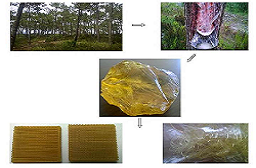Day 1 :

Biography:
Abstract:
Keynote Forum
Geoffrey R Mitchell
Tbilisi State Medical University, Georgia
Keynote: Rsin based composites, the ultimate green material
Time : 10:30-11:00

Biography:
Geoffrey Mitchell is passionate about direct digital manufacturing which enables products to be manufactured directly from a digital design without the need for specialist tooling or moulds and the development of novel materials to support the emerging technologies associated with DDM. He brings a wealth of experience working with polymer based materials both natural and synthetic. He is fascinated by the links between the scales of structures present in all materials and especially biopolymers. He is focused on using processing as a tool to control those scales of structure and hence define the final products of the material.Abstract:
The current world-wide focus on Climate Change has led to a re-evaluation of all aspects of manufacturing in order to reduce the level of carbon dioxide released in to the atmosphere. One approach has been to look to the natural world for the raw material supply on the basis that this is sustainable. This has led to an over simplification of the problem. We still need to minimize the consumption of energy and the inclusion of other non-sustainable sources of raw materials as well as minimizing waste production. As part of the Research Programme of the Centre for rapid and Sustainable Product Development we have initiated a major stand of work under the umbrella of “Adding value to Forest based Products”: The basic objective is to increase the economic value of forests to ensure their stability and to underpin biodiversity, both objectives are critical to the Paris Accord (United Nations Framework Convention on Climate Change dealing with greenhouse gases emissions mitigation, adaptation and finance). Historically, Portugal was the leading exporter in the world of Rosin, a material obtained from pine resin. The pine forests of Portugal are particularly suited to the production of rosin, but in recent years the forests have declined due to poor maintenance and cheap importants of rosin from other countries. Pine resin as tapped from trees contains a mixture of Rosin which itself is a mixture of chemical compounds, water and turpetine. The Rosin is extracted using a particularly eco-friendly process require no other input than the pine resin. The output streams are Rosin, Turpentine and clean water. In order to maintain the green creditionals we are look to products which require no further processing of Rosin both to reduce waste and also minimize energy consumption. To date we have produced an eco-foam, composites and scaffolds for tissue engineering.

Keynote Forum
Blanka Rihova
Director Institute of Microbiology AS CR, Czech Republic
Keynote: HPMA Copolymer-Bound Doxorubicin as Endogenous Vaccine Substantially Increases Therapeutic Effect of Check-Point Blockade Monoclonals: Acute versus Chronic Model
Time : 11:00-11:30

Biography:
Blanka Rihova is Professor of Immunology, Charles University, Prague, the Czech Republic and Adjunct Professor of Pharmaceutics and Pharmaceutical Chemistry, University of Utah, Salt Lake City, USA. In 2000–2007 she was a director of the Institute of Microbiology, Academy of Sciences of the Czech Republic. She is president of Czech Immunology Society, vice-president of Czech Learned Society and vice-president of Scientific Council of CAS.
Abstract:
DOXHYD-HPMA is doxorubicin bound through hydrazone bond to synthetic polymeric carrier based on N-(2-hydroxypropyl)methacrylamide. It is effective anticancer polymeric prodrug with decreased side-toxicity and the ability to induce immunogenic cancer cell death releasing site-specific tumor antigen and thus acting as endogenous vaccine. We have compared chemo-immunotherapy combination treatment of EL4 T cell lymphoma and 4T1 breast carcinoma with DOXHYD-HPMA and with immune checkpoint blocking anti-CTLA-4 and anti-PD-1 MAbs either alone or in a mixture. To document the role of intestinal microbiota we use germ-free (GF) mice and GF mice monocolonized with Bifidobacterium thetaiotamicron. Acute model of disease when mice are transplanted once with a lethal dose of tumor cells was compared with chronic model where mice are injected six times every other day with a low number of tumor cells. Healthy mice treated with anti-CTLA-4 and anti-PD-1 mAbs did not show any signs of toxicity while significant co-toxicity was seen in cancer-bearing mice. Treatment with checkpoint inhibitors only exerted a very limited cancer response as no long term survivors (LTS) were recorded. On the other hand more than 60% of mice injected also with therapeutically suboptimal dose of DOXHYD-HPMA survived disease-free for more than 100 days. Those suffering from chronic model of cancer showed considerably higher proportion of PD-1+ cells in tumor microenvironment and reacted substantially better to anti-CTLA-4 or anti-PD-1 treatment than mice with the acute model
 Geoffrey R Mitchell photo" title="Geoffrey R Mitchell" class="img-responsive thumbnail pull-left">
Geoffrey R Mitchell photo" title="Geoffrey R Mitchell" class="img-responsive thumbnail pull-left">

